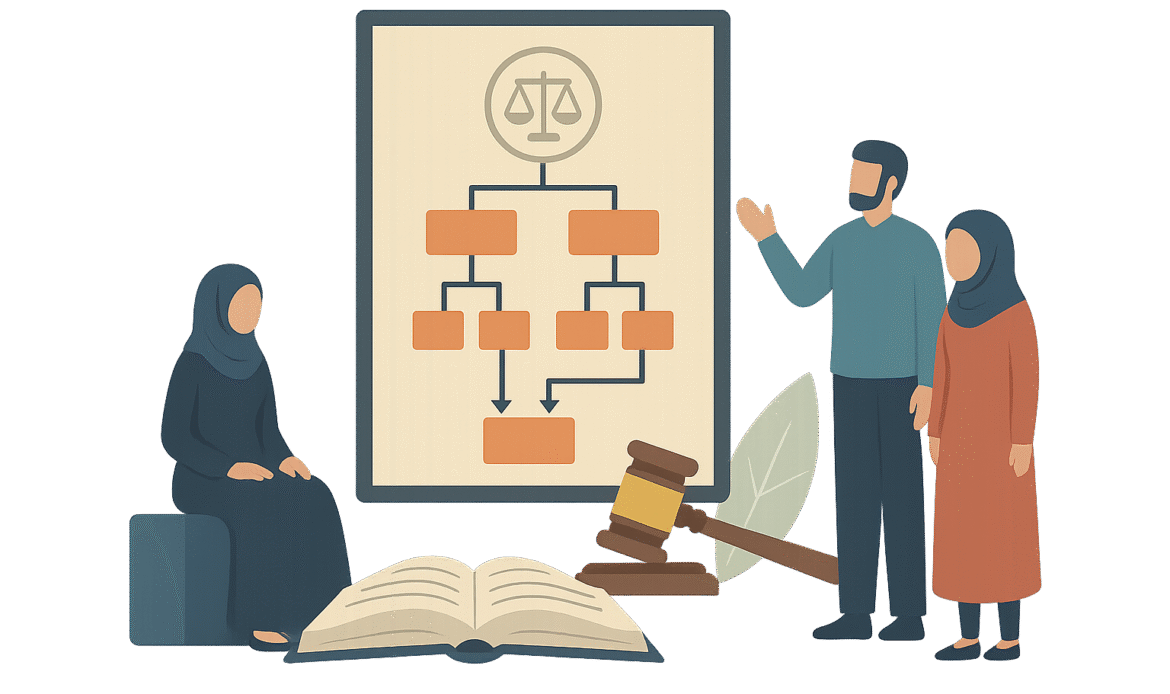Estate Distribution Process in Islamic Wills
- Go Lawyers
Estate Distribution Process
Understanding the estate distribution process in Islamic wills is vital for anyone wishing to comply with Islamic inheritance laws. This process ensures that wealth is distributed fairly and according to religious principles, which is especially important for Muslims living in countries like Australia, where Islamic law is not the default legal framework. It provides a sense of spiritual fulfilment and legal assurance that one’s final wishes will be respected and executed faithfully.
Navigating the intersection between religious obligations and secular legal systems can be challenging. Therefore, gaining a thorough understanding of the estate distribution process in Islamic wills is not just a matter of compliance but also of preserving one’s religious identity and values. This knowledge empowers individuals to plan their estates in a way that honours their faith while ensuring that their family is provided for according to both religious and legal standards.
Understanding Business Disputes
Commercial lawyers provide clarity and strategy to manage and resolve business conflicts efficiently.
The Role of Commercial Lawyers in Parramatta
Local commercial lawyers offer tailored legal guidance to help businesses avoid and resolve disputes.
How Commercial Lawyers Navigate Disputes
They assess disputes, create strategic plans, and apply resolution methods suited to each case.

What is an Islamic Will?
An Islamic will, also known as “Wasiyyah,” is a legal document that outlines how a Muslim’s estate should be distributed after their death. Unlike wills in some other legal systems, Islamic wills are governed by specific religious laws known as Sharia. These laws provide clear guidelines on how assets should be allocated among heirs, emphasising fairness and equity as prescribed in Islamic teachings.
The role of an Islamic will extends beyond mere legal formalities. It serves as a reflection of one’s faith and commitment to Islamic principles. Creating an Islamic will is an act of devotion, demonstrating an individual’s desire to fulfil religious duties even after death. It ensures that the distribution of wealth aligns with the spiritual and moral values cherished in Islam, thereby strengthening familial and communal bonds.
What is the Estate Distribution Process?
The estate distribution process refers to the sequence of legal and procedural steps taken after someone passes away to ensure their assets are distributed lawfully. In the context of Islamic wills, this process must adhere to both Australian succession law and the Qur’anic rules of inheritance. The alignment of both legal systems ensures that the estate is settled without conflicts and in accordance with Islamic teachings.
- let’s navigate your path forward together.
Planning Your Estate Distribution? Let Us Help You.
Get expert guidance on the estate distribution process from specialists in Islamic wills. Ensure legal clarity and protect your heirs with confidence.
Key Components of an Islamic Will
An Islamic will should include:
- Executor Details: The person responsible for carrying out the terms of the will. This individual must be trustworthy and knowledgeable about Islamic inheritance laws to ensure that the will is executed correctly and fairly.
- Beneficiaries: Individuals who will receive parts of the estate. The will should clearly specify the shares allocated to each beneficiary, taking into account the fixed shares and priorities outlined in Islamic law.
- Debts and Liabilities: Any outstanding debts should be cleared before distribution. This step underscores the importance Islam places on fulfilling financial obligations, as leaving debts unpaid can burden both the deceased’s soul and their heirs.
- Charitable Donations: Up to one-third of the estate can be allocated to charitable causes or individuals who are not heirs. This provision allows the testator to express generosity and support for causes that align with their values, reinforcing the communal spirit of charity in Islam.
Islamic Inheritance Laws
Islamic inheritance laws are derived from the Quran and Hadith and are considered a divine mandate. They ensure that the distribution of an estate is just and equitable, reflecting the importance of family and community in Islam. These laws serve as a framework for maintaining social balance and harmony, ensuring that no member of the family is unjustly deprived of their rightful share.
The principles of Islamic inheritance emphasize the importance of responsibility and care within the family. By adhering to these laws, Muslims demonstrate their commitment to the teachings of Islam and their respect for the rights of all family members. This system of inheritance fosters a sense of unity and continuity, as wealth is passed down through generations in a manner that honors religious teachings.
Principles of Islamic Inheritance
- Fixed Shares: Specific shares are allocated to certain relatives. For example, sons receive twice the share of daughters, a principle rooted in the financial responsibilities traditionally assigned to men. This distribution reflects the societal roles envisioned in Islamic teachings, ensuring that financial support is available to those with greater familial obligations.
- Immediate Family Priority: Priority is given to immediate family members, such as spouses, parents, and children. This ensures that those closest to the deceased, who may rely most heavily on their support, are provided for, preserving the family’s stability and well-being.
- Residue Distribution: If there is any estate left after fixed shares are distributed, it is divided among the residuary heirs. This ensures that even those not explicitly mentioned in the primary allocation receive a portion of the wealth, promoting inclusivity and fairness within the family.
Common Terms in Islamic Inheritance
- Farāʾiḍ: The fixed shares of inheritance as outlined in the Quran. These shares are divinely ordained, emphasizing the importance of adhering to religious directives in estate planning.
- Asaba: Relatives who receive the residue of the estate. They play a crucial role in ensuring that any remaining wealth is distributed equitably among the wider family circle.
- Wasiyyah: The will itself, allowing for discretionary distribution up to one-third of the estate. This provision offers flexibility within the constraints of fixed shares, allowing individuals to express personal wishes in their estate planning.
Steps in the Estate Distribution Process
Understanding the estate distribution process in Islamic wills involves several steps to ensure compliance with Sharia law. Each step is integral to fulfilling the religious and legal obligations associated with Islamic inheritance, ensuring that the deceased’s wishes are honored and that their estate is managed responsibly.
Step 1: Pay Funeral Expenses
Before any distribution, the deceased’s funeral expenses are paid from the estate. This step underscores the respect and dignity accorded to the deceased, ensuring that their final rites are conducted in accordance with Islamic traditions.
Step 2: Settle Debts
All outstanding debts and obligations must be settled. This is a critical step as Islamic law emphasizes the importance of fulfilling financial obligations. Paying off debts is seen as a moral duty, reflecting the principle that one’s actions in life should not leave a negative impact on others after death.
Step 3: Execute the Wasiyyah
The will is executed, allowing up to one-third of the estate to be allocated as specified by the deceased, including any charitable donations. This step provides the testator with an opportunity to express personal wishes and support causes or individuals that hold special significance to them.
Step 4: Distribute Remaining Estate
The remainder of the estate is distributed according to Islamic inheritance laws. This involves calculating the shares for each eligible heir, ensuring that the distribution is conducted fairly and transparently. Adhering to this process fosters trust and harmony among the heirs, reinforcing the values of justice and equity.
Challenges of Islamic Wills in Australia
Muslims in Australia face unique challenges when it comes to implementing Islamic wills, as the country operates under a secular legal system. Here are some common challenges:
Legal Recognition
While Islamic wills are respected within the Muslim community, they must also conform to Australian laws to be legally binding. This means drafting a will that satisfies both Islamic principles and Australian legal requirements. Navigating this dual compliance can be complex, necessitating careful planning and expert guidance to ensure that the will is recognized in both legal and religious contexts.
Cultural Sensitivity
Understanding and respecting cultural differences can be complex, especially in a multicultural society like Australia. It’s important for executors and legal professionals to approach Islamic wills with cultural sensitivity. This involves acknowledging the diverse backgrounds and beliefs of individuals involved in the estate process, fostering an environment of respect and understanding.
Lack of Awareness
Many Muslims in Australia may not be fully aware of the requirements for a valid Islamic will. Community education and access to knowledgeable legal advice are crucial for ensuring compliance. Raising awareness through community workshops, legal seminars, and religious teachings can empower individuals to make informed decisions about their estate planning.
Creating an Islamic Will in Australia
To create an Islamic will in Australia, it’s advisable to consult with both religious scholars and legal professionals who specialize in this area. Here’s a simple guide:
Step 1: Consult a Religious Scholar
Seek guidance from a qualified Islamic scholar to ensure your will aligns with Islamic laws. This consultation helps clarify religious obligations and ensures that the will reflects the spiritual values that are important to you.
Step 2: Draft the Will with a Legal Professional
Work with a lawyer experienced in both Islamic and Australian inheritance laws. This helps ensure your will is legally valid in Australia and respects Islamic principles. A well-drafted will minimizes the risk of legal disputes and ensures that your estate is distributed smoothly and in accordance with your wishes.
Step 3: Communicate with Family
Discuss your wishes with your family and ensure they understand the Islamic principles behind your estate planning. Open communication fosters transparency and reduces the likelihood of misunderstandings or conflicts among heirs.
Step 4: Regularly Update the Will
Life circumstances change, so it’s essential to review and update your will regularly to reflect any new personal or financial situations. Regular updates ensure that your will remains relevant and accurately reflects your current intentions and obligations.
Conclusion
The estate distribution process in Islamic wills is a vital component of financial planning for Muslims. By understanding and adhering to Islamic inheritance laws, individuals can ensure their estate is distributed according to their faith. In Australia, this requires careful navigation of both religious and legal frameworks. By consulting with knowledgeable professionals and educating oneself on the intricacies of Islamic wills, Muslims can achieve peace of mind knowing their legacy will be honored in both spiritual and legal terms. This dual compliance not only preserves religious values but also ensures that the estate is managed in a manner that respects both individual wishes and societal norms.
- Expert Mediation Services
Find Resolution, Not Conflict
Disputes don’t have to lead to lengthy court battles. At Go Lawyers, our mediation lawyer services provide a practical and efficient way to resolve conflicts. Our experienced team fosters constructive dialogue to achieve fair and mutually beneficial outcomes, whether it's family mediation, business disputes, or transactional issues.
Let us guide you toward a solution that prioritises your interests while preserving relationships.
- Why Choose Go Lawyers?
Professional Lawyers who offer a fixed, fair price
Whether you are an individual, a business owner, or part of a giant corporation, our experienced team delivers solutions that protect your interests and drive results. From drafting contracts and negotiating agreements to resolving disputes through mediation or litigation, we handle every aspect of your legal needs professionally and carefully.
We understand the importance of clear communication and cost-effective services, so we prioritise transparency and efficiency. Our team possesses expertise in risk management, compliance, and the resolution of commercial disputes, allowing you to depend on us as a reliable partner throughout the entire process.
